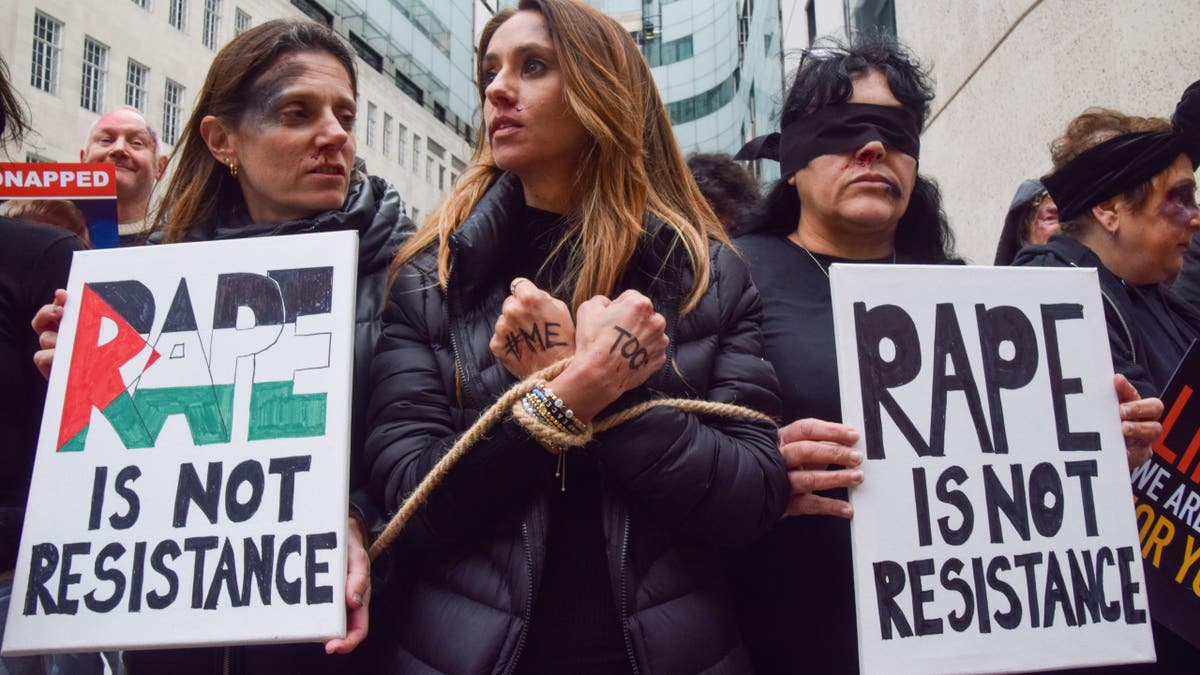Hamas used sexual violence against Jewish women as a 'tool of war': Ayaan Hirsi Ali
Hoover Institution research fellow Ayaan Hirsi Ali reacts to the October 7th attack against Israel being omitted from Kamala Harris' brief on conflict-related sexual violence on 'America Reports.'
Reflections on the anniversary of the Oct. 7, 2023, massacre in Israel must not only consider the tragedy itself but the silence that followed.
That day, Hamas militants unleashed unspeakable violence, deliberately targeting civilians. Among the victims were hundreds of women and girls who were subjected to sexual violence – an intentional strategy designed to terrorize and degrade.
Yet, despite the horrific nature of these acts, international bodies, including the United Nations, took weeks – if not months – to even acknowledge what had transpired. Leaders who claim to stand for women not only failed women with their words; it was a failure to act.

Pro-Israel activists, some tied up or wearing blindfolds, demonstrate outside BBC headquarters in London on Feb. 4, 2024, in response to the footage of Israeli women hostages being paraded when Hamas attacked Israel. (Vuk Valcic/SOPA Images/LightRocket via Getty Images)
Silence is not neutral.
AS OCTOBER 7TH ANNIVERSARY APPROACHES, JEWISH STUDENTS BRACE FOR PROTESTS, VOW TO ‘WALK PROUDLY’
The use of sexual violence as a weapon in conflict is not a recent phenomenon. It is an age-old, barbaric tool of war, used to humiliate, destabilize and traumatize communities. However, the global community's muted response to the sexual atrocities of Oct. 7 reveals a troubling double standard.
Israeli women did not receive the swift and vocal condemnation for gender-based violence that is often extended in other conflicts. While many leaders and organizations, such as UN Women, eventually condemned the violence, it took them over 50 days to issue a statement denouncing these acts. This delay occurred despite a significant body of credible and corroborated evidence available at the time.
Even without an official report, every woman who saw that video of a young woman, her sweatpants stained with blood, instinctively knew the devastating reality behind those marks. That unspoken understanding crosses every boundary—cultural, political or religious. It’s a truth embedded in the experience of being a woman, a shared recognition of the raw vulnerability to violence that so many of us have felt, feared or survived.
Yet, the willful delay of condemnation, combined with the relative silence from many women's rights organizations, reflects a larger issue where political affiliations seem to overshadow the fundamental responsibility to stand against rape as a weapon of war.
Silence in the face of gender-based violence is complicity. When leaders delay or fail to acknowledge such atrocities, they send a message that the suffering of women, especially in complex geopolitical conflicts, can be overlooked. It is precisely this neglect that fuels cycles of violence, making it clear that women and girls are collateral damage, their dignity expendable.
It also reflects a profound unwillingness to confront uncomfortable truths about the nature of this violence and who it is perpetrated against.
There remains a persistent reluctance in the West to confront and criticize cultures that subjugate women through practices like stoning for adultery or forcing women to cover their faces. Political correctness has led to a loss of moral clarity, and an inability to confront harmful practices and values that undermine human rights.
END US FUNDING FOR UN AGENCY GIVING IMMUNITY TO ITS MURDEROUS HAMAS MEMBERS
This reluctance to offend has led to dangerous acceptance and moral relativism. Practices such as honor killings or female genital mutilation are undeniably violations of basic human rights. Yet, the guise of inclusivity shields these practices from criticism, framing them instead as cultural differences that must be respected.
Tacit acceptance has consequences. In fact, the United Nations, the same body that failed Israeli women so spectacularly, also reported a 50% increase in verified cases of conflict-related sexual violence from 2022 to 2023. When women are overlooked or targeted in this way, the global response must be swift and unequivocal. Whether in Israel, Ukraine, Sudan or elsewhere, we must demand accountability for those who weaponize gender-based violence.
Protecting women and girls requires a clear, unambiguous commitment to their dignity, safety and inherent worth. It means recognizing that sexual violence is not just an issue of war, it’s an attack on the very identity of women.
We need leaders who are willing to confront these truths, who will stand up unequivocally against violence, and who will advocate for policies that protect the most vulnerable, not shy away from defining who they are.
CLICK HERE FOR MORE FOX NEWS OPINION
This anniversary must serve as a call to action and a reminder that silence is not an oversight, it is a betrayal. If the international community continues to hesitate, it signals that the lives, bodies and dignity of women are negotiable.
Women and girls must not be sacrificed on the altar of political expediency, and none of us should remain silent when women and girls’ bodies are turned into battlefields.





